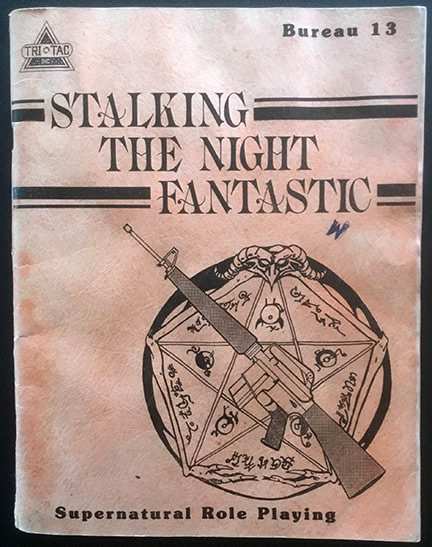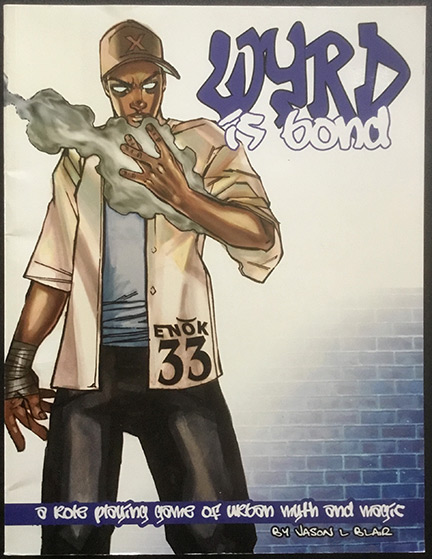This is part 3 in a series discussing forgotten RPGs (Part 1 can be found here and Part 2 here). That is, games most people have never heard of or that didn't last long on store shelves for one reason or another. This batch consists of supernatural games. These games have been sitting on my shelf for years, mostly ebay finds to add to my collection.


1. Stalking the Night Fantastic (by Richard Tucholka; published by Tri Tac Inc. in 1983)

You are a government agent charged with taking out supernatural threats in this game. Characters consist of about 17 statistics. I say about, because some are computed and others are rolled as 4d6-4. The rolled ones are strength, constitution, dexterity, agility, intelligence, wisdom, luck, charisma, accuracy, sensitivity, and magic resistance (1d6). Others include psionics, throw, dodge, hit points, magic, and piety. Then there are skills... lots of skills, each rated from 0 to 20. Tasks are performed as percentage rolls, with the difficulty (1-13) determining the base percentage (+95% to -95%), and an appropriate skill adding 5% per level. An interesting rule allows for random difficulties. For example, how hard is it to perform an easy acrobatic stunt? Roll a d4 to determine its difficulty. That sounds rather unique, although Two-Fisted Tales does include random target numbers, but mostly for automatic success/failure. So what happens next? Adventures consist of fighting the bad guys, which are typically monsters like vampires, ghosts, and mortal threats. There are special rules for different types of damage, like blades, burns, infections, and atmospheric pressure. There's psi powers, magic, priestly powers. All in all, this probably set the standard of the time for completeness. The only thing missing is a sample adventure. This would have had two direct competitors: Call of Cthulhu and Chill. The former doesn't really have common supernatural creatures, so Chill would have remained my pick back in the day. Still, there's a lot to be said about this game's content. Tri Tac games is still around and this game seems to now go by the name Bureau 13.




2. Lost Souls (by Joe and Kathleen Williams; published by Sage Lore Productions in 1992)

This game is all about playing someone who has died. Your age, physical features, personality traits, interests, ghostly visage, profession while alive, type of lost soul (apparition, banshee, wraith, etc.), unfinished business, and a number of other elements are determined randomly. There are 12 base skills rated from 2 to 19 (with other skills attached to them): agility, alertness, charm, cunning, dexterity, fate, intelligence, knowledge, mechanical, nature, stamina, and strength. I'm not sure how I feel about lost souls having skills like this. I kind of picture something more ethereal. Each earthly profession (like scholar, artist, or private eye) dictates how to determine the rating for each base skill, along with a random cause of death. The type of lost soul dictates the character's consistency (solid, luminous, or vaporous) and special powers. The outcome of using skills is determined by making a percentage roll and consulting the action table; there are five levels of failure and five levels of success. Difficulty can be modified by skill adjustments or outcome column shifts. Contests are resolved by best outcome. There's some interesting elements in the mix, including mediums (clerics, psychics, etc.), evil entities, planes of existence, hazards, and even a sample adventure. This is a solid game, much lighter in tone than White Wolf's Wraith, but I suspect it needs a committed group of players. I'm not sure I could get more than one adventure out of it. Fortunately, you can make your own decision on that point, since it has been made freely available for download by the author (Link).




3. NightLife (by Bradley K. McDevitt and L. Lee Cerny; published by Stellar Games in 1990/1992)

This came out around the same time as White Wolf's Vampire: The Masquerade. In a nutshell, it is World of Darkness (WoD) without the angst and in only a few books. Whereas World of Darkness splits up the various playable creatures into factions, NightLife simply lets you play a vampire, werewolf, ghost, daemon, wyght (otherworldly being), inuit (nature spirit), or animate (created beings). There are 8 abilities determined by 4d10: strength, dexterity, fitness, intellect, will, perception, attractiveness, and luck. Similar to WoD Vampire, a character's humanity is tracked. A number of skills are determined by adding 1d10 to a base value (typically the linked ability), and each creature gets is own set of edges (powers). Skill rolls are essentially percentage rolls. The game takes place in New York City by default. Various locations are described, as are groups, factions, gangs, and the like. An interesting addition is that you can also play other creatures as an option, including medusae, goblynnes, and sidhe. There's also a section on important NPCs to add more flavor to the setting. Perhaps not as elegantly produced as WoD, I consider this game to be a true classic, worth checking out if you can find a copy.




4. Revelation (by James C. Taylor Jr; published by Happy Nebula Adventures in 1998/1999)

The cover is certainly interesting. An angel with a machine gun. This has got to be wild. Of note is that the GM is called G.O.D., the Game Operations Director. Alien entities that people think to be demons are invading our world (there are also vampires and such). A secretive group who knows the truth, rather than thinking it to be the End Times, hunts down these creatures. Characters consist of 10 attributes: agility, speed, strength, vigor, appearance, demeanor, intelligence, knowledge, perception, and tenacity. Interestingly, these attributes are rated by a die code: d4, d6, d8, d10, d12, 2d8, d20, or 2d12 (or more for the supernatural). Is this the first such use of this in a game? Virtues and shortcomings can also be chosen. Skills are rated linearly, from 1 to the linked attribute's die code (d4 would be 4), although 4 is the maximum at this point. They basically add their value to a die roll (a d6 attribute and skill level of 2 would be d6+2), which would need to beat the difficulty (contests go to the higher roll). We get magick powers, psionics, miracles, and supernatural creatures. I really want to like this. It sounds like a fun game. Something just feels missing. I can't put my finger on it. Fortunately, you can make up your own mind, as it is still available in PDF format.




5. Abyss (by Marco Pecota and Wes Johnson; published by Global Games in 1997)

Set in the world of Dante's Inferno, this is pretty dark. Basically, everything is demon-like. You get to pick your own race, whether it be gnome, elf, minotaur, or whatever -- it doesn't really matter. There are plenty of samples to guide you. Each character has 3 vitalities (rated 1-20): physical, mental, and magical . Then there is a defense rating for each vitality (1-3), and essence and perception ratings. Skills are rated with a formula, typically determined by one or more vitalities. Tasks are handled by rolling the number of dice specified by the skill, reducing the number of dice by a value specified by the difficulty. If at least one 6 is rolled, the task is a success. Magic spells are handled in a similar manner. A number of scenarios are included to give you a feel for the game. I have two problems with the game: rules organization and the font used for setting information is very hard to read. It's a very interesting concept, but I'm not sure I can get into the setting. Of course, the rules can be borrowed for any setting, but there are other systems I'd use. This is another game that's stuck in limbo for me (pardon the pun). While I generally like the art, I don't think it conveys the setting properly.




6. Wyrd is Bond (by Jason L. Blair; published by Key 20 Publishing in 2003)

Think street gangs and rappers with magic instead of guns and mere words. Kudos for a very unique concept. Players portray slingers, or gangstas that use magic. Unlike most other games, characters do not have any set attributes. Instead, the gang they join describes certain elements, like intolerances, clothes/colors, symbolism, musical sound, and weaknesses, as well as special tricks, bonuses, and the type of slings (spells) they use. Juice is the character's fuel for slinging. His gang dictates how it is gained (or a personal ritual is used). Slings are like spells, but very open and free-form. They can do damage or perform some trick. 3d6 are rolled to sling, with each die placed under either order, power, or payback to determine the outcome. The difficulty determines the value needed on the power die (2+). For opposed rolls, the highest power die wins. Special traits can add or subtract dice for the roll, but only three dice are placed. Skills add extra dice and they are placed next to the regular dice. Here's the catch. If the character does not have enough Juice to fuel the sling, its power is reduced to whatever amount of Juice he has. On to the other placed dice. Order determines the speed at which the sling is cast (who acts first), while payback provides special effects like rolling over payback to order or power for the next roll, or absorbing damage. That's basically the game. There's no huge meta-plot or complicated backstory. It's gang vs. gang in a world of slinging magic. A few sample scenarios are also provided to help guide you into this world. It's a fun system, but long-term play probably needs a very immersed group and evocative GM. This is a short book, just under 100 pages, for those who want to get more done with less reading. My only real nitpick is that the header font is hard to read (it mimics tagging).




That's another batch done. I'm considering universal systems for the next set, but I'm open to suggestions. Probably, another installment of fantasy after that. If you're looking for similar games, Precis Intermedia's Bloodshadows is a mix of fantasy, noir, magic, and horror; Ghostories focuses on supernatural mysteries in a concise yet packed book.


Part 4... |







